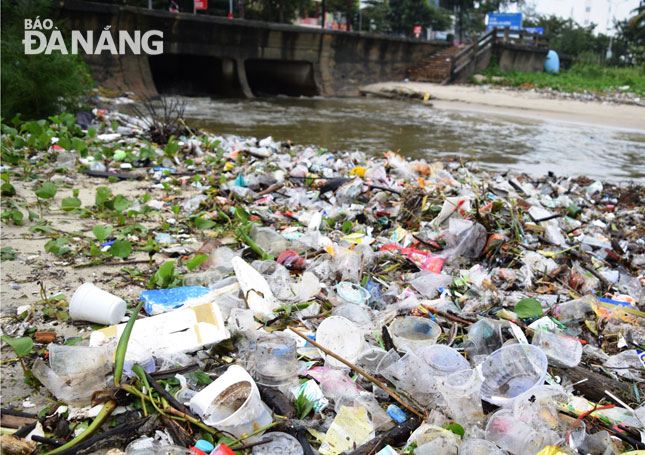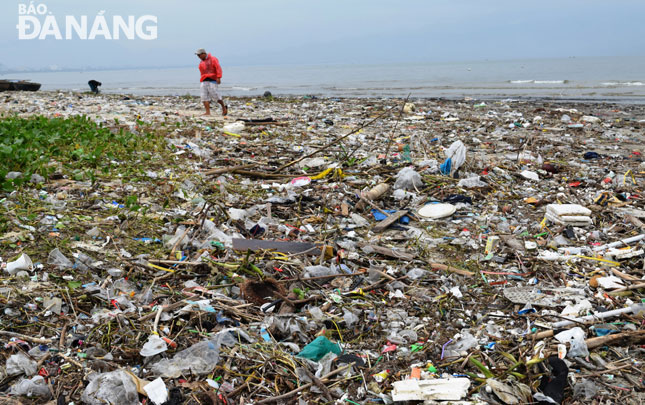Plastic waste becomes burning issue in city
Nearly 100m3 of plastic waste are generated by a total of 20 bubble tea shops across Da Nang’s Hai Chau District on a monthly basis. The alarming figure was released by Mr To Van Hung, the Director of municipal Department of Natural Resources and Environment at a recent session of the municipal People’s Council.
 |
| A large amount of plastic waste seen along the sides of the drain outlet opposite to Ton That Dam Street |
In reality, only a small proportion of plastic waste has been recycled, and the rest still exists in the environment, particularly makes all the way to the ocean.
The city now sees the daily use of such plastic products as cups, straws, bags, plates, and spoons at eating, drinking, and trading areas.
It is reported that a customers-packed bubble tea shop on Nguyen Van Linh Street, opening daily from 8.00am until 10.00pm, dumps an estimate of about 1m3 of plastic cups and straws into public dustbins every day.
Meanwhile, a street vendor selling meal Styrofoam boxes in Hai Chau District, revealed that, each day, she sells a total of between 1,500 and 2,250 boxes and between 2,000 and 2,500 plastic cups.
In an attempt to tackle this burning issue, besides appeals for garbage collection, the district authorities have launched a wide range of highly efficient and practical activities to encourage their residents to reduce plastic use and disposal of non-biodegradable plastic bags into the environment, and enhance garbage classification for the sake of environmental protection.
It is no denying that plastic products bring convenience, but also produce a huge disastrous thing called ‘white pollution’, which has become a burning issue in today's world.
‘White pollution’ refers to solid waste which comes from the usage of various types of plastic products. Most plastic bags, which are a major source of pollution in the country, serve for around 10 minutes, and take up to a millennium to degrade.
The Department of Industry and Trade-launched project to restrict the use of non-biodegradable plastic bags at traddional markets and supermarkets has helped to minimise the negative impact of these harmful items on the environment.
 |
The city is aiming to reduce the total amount of nylon bags by 65% by 2020 at supermarkets and shopping malls, and by 50% at traditional markets across the city.
Such simple deeds as promoting the use of eco-friendly bags in place of plastic bags and reduce consumption of single-use plastics are considered as good solutions to the environmental pollution in the city, and across the entire globe as a whole.
To date, more traders at traditional markets have provided their shoppers with biodegradable bags, instead of plastic ones. Also, they have also become actively involved in plastic waste collection.
Every day, between 900 and 1,000 tonnes of solid waste are collected from across the city and buried at the Khanh Son Landfill in Lien Chieu District’s Hoa Khanh Nam Ward.
The recent session of the municipal People’s Council has adopted a resolution regarding solid waste management in the city.
The city has set a target of collecting 95% of solid waste for treatment over the 2019 – 2025 period, with 12% and 15% to be recycled and reused in 2020 and 2025 respectively.
In order to realise the above objectives, from now towards 2025, the city will spend a total capital of up to 5,886 billion VND on developing infrastructure facilities designated for the collection, transportation and treatment of domestic waste.
Of this figure, 5,500 billion VND will come from investors form both home and abroad, whilst 356 billion VND will be funded by the State budget and the remainder will be from international cooperation projects.